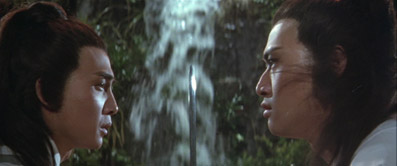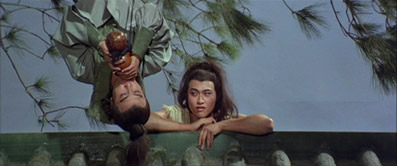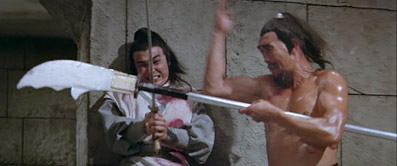|
If
you're a fan of old school John Woo, you'll likely to have become so though
his Hong Kong crime actioners such as The Killer
and Hard Boiled, which you may well have discovered retrospectively after finding content of interest in his
Hollywood adventures. If you've done your research you'll
know that Woo began his career as a director of martial
arts actioners like the 1976 Hand
of Death, well made genre pieces notable for
their smartly choreographed and extended fight sequences. Those
interested in the chronology of style development may be
wondering just how what became known as Woo's Heroic Bloodshed
movies came to be, whether it was a sudden change of direction
or the result of a more gradual shift from one sub-genre
to another, and if so, was there a film that marked the
mid-way point between the two? Good people, say
hello to Last Hurrah for Chivalry.
It
all kicks off in typical martial arts movie style when the
wedding party of master Kao Peng is invaded by his father's
nemesis Pak Chong-Tong and his boys, who leave Kao injured
and give his men a pasting. Kao wants revenge, but his sifu
assures him that he's not up to the job. A hunt begins for
a suitable fighter and one is quickly found in the shape
of good-natured stable worker Chang, otherwise known as
The Magic Sabre, a warrior who is uncomfortable with his past reputation.
These days, you see, he uses his skills to punish rudeness or minor
injustice, his time otherwise occupied with caring for his sick
mother, listening dreamily to the music played by a local
concubine, and smacking up his sister's boyfriend for saying
he won't marry her. He's not really interested in working
as a hired fist, but he and a freelance assassin known as
Greeno are pulled into the fray when a mysterious swordsman
directly challenges them and kills a few more of Kao's men
as a persuasive nudge.

If you're not keeping an eye on the clock then much of Last
Hurrah for Chivalry appears to play out to generic
expectations, from the opening assault to the search for
warriors and the pre-last act challenge. There's even the
expected final battle, an extended one-on-one fight in which
the good guy rediscovers the skills from his past and narrowly defeats his enemy with a particularly well-timed move.
Except when we reach this stage we're only halfway through
the movie. If you hadn't already realised that this was
more than just a standard martial arts film, you'd certainly
know it now.
Even in first half there are signs that Woo is planning
to deviate from a usually rigid generic norm. The first
meeting of Chang and Greeno is particularly memorable, as
the former lies on a rooftop overlooking a brothel garden
enjoying the concubine's music and Greeno falls into shot,
dangling upside down from a tree and bemused by his location.
Unfazed, Chang shares a drink with him and the two strike
up a conversation in a scene that actually borders on the
surreal. Greeno, it turns out, is not only a boozer of heroic
proportions but is also the sweetheart of the very same
concubine whose music has so enraptured Chang. It's something
of a one-way romance – she loves him, but he divides his
time between killing for cash and drinking like a dehydrated
alcoholic fish. "I'm a loner," he tells her. "I
will die alone. I'm nobody's friend." As with Chang,
there's the suggestion of a darker past that is never explored
or explained. It doesn't need to be.
Once
into the second half, fans of Woo's later Hong Kong work
will soon find themselves at home, as Chang and Greeno repeatedly
cross paths and strike up a friendship based on
mutual respect and later launch a two-man assault on Pak's heavily
defended compound. At one point they pause during a momentary
break in the fighting so that they can briefly discuss tactics
and Greeno can have another drink, and you could almost
be watching The Killer but with swords
substituted for guns. Last Hurrah for Chivalry
is not just a pointer to the Heroic Bloodshed movies to
come, it absolutely is one of them, in the teaming of the
two fighters and their battle against seemingly impossible
odds, in the bonding of two killers through a common cause,
in the importance of honour in an otherwise corrupt world,
and in the betrayal of those beliefs for money and power by
the unworthy.

Technically
the way forward is also signposted, with splendidly
choreographed and briskly performed action sequences that are peppered
with handsomely shot slow motion, which is integrated into
the action as smoothly as Peckinpah at his best. The final
confrontation also prefigures the later Wuxia films with
the sort of gravity defying wire work that was
eventually to become a generic norm. Particularly
enjoyable is how well the comedic elements are incorporated
into the action and drama, the knockabout silliness that
characterises and sometimes blights many kung-fu comedies
replaced by a more character-based approach and an engaging
eye for the oddball. Greeno drinking a flask of wine and
then smashing the bottle on his own forehead may have an Animal House ring,
but there is peculiar purpose to his actions, and a fighter
who employs a style known as Sleeping Buddha kung fu, in
which acrobatic combat is interrupted by brief narcoleptic
cat-naps, provides the film with it's oddest fight scene, one borrowed by Stephen Chow for a similarly comic battle in
the 1992 King
of Beggars.
Last
Hurrah for Chivalry has a plot density and dramatic
gravitas that was almost unheard of in 70s martial arts
cinema, but still delivers in spades on the action, with
varied, energetically choreographed and long-running fight
sequences (although briefly interrupted for some political
intrigue, Chang and Greeno's assault on Pak's fortress runs
for almost a quarter of the film's length) and a nice line
in offbeat character humour. That these various elements
all work so well is one thing, but that they do so in such
perfect harmony makes the film one for genre devotees to
savour. But it should also be considered essential viewing
for all fans of John Woo's Heroic Bloodshed films, as despite
the period setting and the swordplay, this is up there with
the best of them.
The
latest release under Hong Kong Legends' Ultrabit banner,
the transfer here is once again an impressive one, with
excellent detail, natural-looking colour and generally solid
contrast and black levels. For a Hong Kong action film from
1978, previously only available in grubby, often panned
and scanned VHS transfers, this is a treat for the eyes.
There is some minor flickering and the occasional darker
shot where the contrast slips a bit, but this is never a
problem.

The
Original Cantonese mono is joined by a new 5.1 remix, and
this is no quick push through the digital encoder but a
well assembled track in which all of the elements, dialogue
included, have been cleaned up and mixed for surround. The
result is very pleasing, with surrounds well used to place
you in the middle of a fight or a rain storm, and to particularly
precise and atmospheric effect in the final battle. There
is also an English dub, which you're only likely to tolerate
if you don't mind watching Chinese actors speaking English
with broad American accents.
There
are musical differences between the various soundtracks
– the opening song, for example, is missing its singer on
the English track, and later there are some small differences
between the Cantonese remix and the original mono. At least
you have both to choose from.
Only
one, and that's a bit of a cheat. Familiar Faces:
A Film Retrospective (10:49) is a collage
of clips featuring stars Lee Hoi-San and Damien Lau demonstrating
their fighting skills from a number of other Contender
releases, making this effectively a slick sales pitch. If
by some quirk you are new to martial arts movies, it should
do the job well.
There
are also the usual collection of trailers
for other Hong Kong Legends releases.
OK,
there's no doubt that a decent expert commentary would have
been good here, and input from John Woo himself even more
welcome. But this is a film-only disc, and you're going
to have to make the decision to buy solely on the strengths
of the film itself and the quality of the transfer. For
fans of martial arts and Heroic Bloodshed movies, this is
a no-brainer and should already be on your shopping list.
|